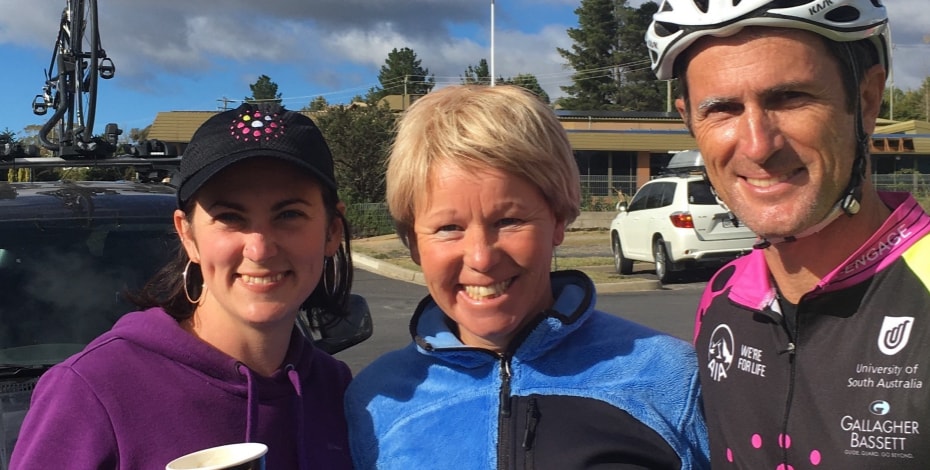
Pain message steps up a gear

Having access to some of the leading thinkers in the world of pain is helping the next generation of physiotherapists and allied health professionals deliver more effective management of persistent pain to regional and rural patients through a pioneering peer-to-peer program.
The Local Pain Educators (LPE) network—the educational platform underpinning the annual Pain Revolution Rural Outreach tours—features participants across a range of healthcare disciplines who undertake a two-year training and mentoring program while implementing pain education in their own rural and regional communities. And it is hoped that some of these participants will then become mentors of the next LPE cohort, says program manager Angie Clerc-Hawke.
‘We say that it’s a two-year program but the idea is that it’s actually self- sustaining, the network continues to grow and then people continue to do their work in their communities,’ Angie says. ‘We take a whole community approach, so there are people in their communities who are going to be providing education to other health professionals as well as the general public.
‘The pain education works on multiple levels—it works as prevention/ early intervention and also helps people with recovery from chronic pain as well as helps health professionals understand the science behind what is happening so as to help people work towards an active recovery using strategies that facilitate self-management. It is being able to empower people on their own journey but also being able to upskill the clinicians and support them in that process.’
The first LPE cohort of 13, who graduated in December, featured a large number of physiotherapists including Abbie Norrish, APAM, who had her own experience of persistent neck pain resulting from a swimming injury. Abbie became acutely aware of the shortage of pain services in rural areas when she had to travel from her hometown of Mukinbudin (population 300), three and a half hours north-east of Perth, to seek specialist treatment for her pain.
Abbie began studying physiotherapy at the University of Notre Dame in 2014 and it was here she was introduced to Explain Pain, the work of Professor of Clinical Neurosciences and foundation chair in physiotherapy at the University of South Australia, Lorimer Moseley, FACP, who founded the Pain Revolution.
‘I was in a lecture in my third year of university and a lecturer was describing symptoms of chronic pain and I was like “oh my god, this is me”. I devoured Lorimer’s book after that,’ Abbie says. After becoming pain-free herself, Abbie was driven to share her knowledge in the field of pain science while working in private practices in Northam and in Perth before settling in her new hometown of Margaret River, three and a half hours south of Perth.
Abbie was teamed up with mentor Helen Slater, FACP, in the LPE program and she called on Helen’s vast experience in rural outreach to help establish community contacts and organise meetings with key stakeholders to facilitate community pain education events last year and some scheduled for this year.
One of the program’s mentors, APA Pain Physiotherapist Matt Forster, who works with pain specialists in a pain clinic in Brisbane, says sharing his knowledge and experience has been a fascinating experience. Like Angie Clerc-Hawke, Matt was also a ‘trailblazing revolutionary’ in the first Rural Outreach Tour ride in 2017 from Melbourne to Adelaide, experiencing the supportive team environment that is required to treat persistent pain.
‘One of the reasons I joined was because of the … need for good quality persistent pain treatment in regional and rural areas. One of the goals of the LPE network is to improve local treatment,’ Matt says. ‘Traditionally, rural-based people with persistent pain would have to drive to a capital city to go to a pain specialist clinic … however persistent pain is best treated in the local community. It’s important that patients can stay in their local community and see a health professional who understands the latest evidence-based treatment for persistent pain—it’s a win-win situation.’
Money raised from the annual Pain Revolution Rural Outreach Tour, which will run from Devonport to Hobart in Tasmania 16–23 March, helps fund the LPE program. On the eve of the launch of the Tasmania tour, Lorimer Moseley will be the keynote speaker at the Tasmania Branch 2019 Annual Symposium. A total of 19 participants will undertake the LPE training this year.
Anyone interested in becoming a part of the network, email lpep@painrevolution.org.
© Copyright 2025 by Australian Physiotherapy Association. All rights reserved.





